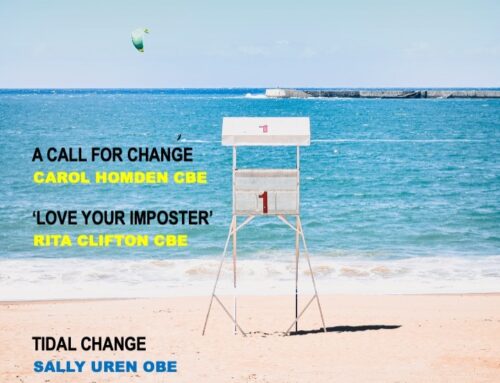Annamarie Phelps CBE
Why Sport Cannot Simply Move On
“It’s only sport, forget the season and move on…”
Anon. Twitter
 Sport isn’t for everyone – but it is for anyone. Anyone that is, who chooses to engage, and more and more are encouraged to do so. Sport promotes good health and well-being, community spirit, engenders belonging and gives us the ultimate reality TV show week-on-week throughout the year. Finally though, by being brought to a grinding halt by the coronavirus pandemic, sport has been exposed for what – for all these reasons and more – it is: a multi-billion-dollar, global entertainment and media business. To assume there is a pause button that will be released in a few weeks – or months – and we will all be back to where we left off, is a naïve assumption. The disruption that COVID-19 has catalysed will have lasting consequences.
Sport isn’t for everyone – but it is for anyone. Anyone that is, who chooses to engage, and more and more are encouraged to do so. Sport promotes good health and well-being, community spirit, engenders belonging and gives us the ultimate reality TV show week-on-week throughout the year. Finally though, by being brought to a grinding halt by the coronavirus pandemic, sport has been exposed for what – for all these reasons and more – it is: a multi-billion-dollar, global entertainment and media business. To assume there is a pause button that will be released in a few weeks – or months – and we will all be back to where we left off, is a naïve assumption. The disruption that COVID-19 has catalysed will have lasting consequences.
The professionalisation of sport has become ubiquitous. For sure it is not just the Premier League and RFU, golf or cricket that rely on media revenues, sponsorship and performance related income of one sort or another. Governing bodies across the UK are no longer run by Will Carling’s bunch of ‘blazered old farts’. Encouraged by funding bodies sport is now run by CEOs, employing performance directors, marketing and media experts; they engage with consultancy firms and discuss activation plans, market shares and sophisticated growth strategies. Sporting organisations own CSR strategies and purposeful mission statements. The age of ‘amateur’ sport has evolved into one that is more corporate than ever. But will the reliance on professional staff help pull sport through the crisis or is it a weakness that could see sport struggle to survive?
Of all the possible risks and mitigations that sports organisations might have had on their registers, the impact of something so miniscule (as a virus) or of such epic proportions (as a pandemic) could hardly have been imagined. Sport is not ‘just sport’. For many it is, quite literally, a way of life and without it life may not go on.
If sport cannot entertain and engage it has no revenue, and without revenue, or certainty around resumption, the fragility of the system is exposed.
In truth reactions and response times across the sporting world have been varied. The need to suspend, delay and cancel events across the globe has certainly opened a Pandora’s Box of unintended consequences and a raft of questions that have yet to be answered. Funding for Olympic and Paralympic sport here in the UK seems to have been swiftly managed in the short term. Athletes are training at home within the confines of social isolation. Some may even relish the idea of a 12-month respite until the Tokyo Games to gain advantage, strength or recover from injuries. How does anti-doping work in an era of social distancing: have we given licence to dopers to increase their habit? How does a doping ban provide a sanction for a guilty party in a time when competition cannot take place? For others it offers more questions, coaches who may otherwise have been planning to change roles may now be unable or unwilling to leave; contractual arrangements for football players given the potential extended season are a lawyer’s delight; athletes who were planning to retire post Games have their lives and future plans put on hold; election dates for new officers, Board members and international federation Presidents are being re-negotiated, constitutions being set aside in crisis mode.
This is not just a pause. Those thinking that missed fixtures can be crammed into an already packed and relentless global calendar of sporting events later this year or next will be disappointed. There is only so much sponsorship that will be available (much less with the expected recession), only so many broadcast hours, so many prime time TV slots and weekends when venues will be available. There will be undoubtedly be winners and losers.
But most of these concerns, focussed on by the media, ignore the immediate and short-term consequences of stopping the relentless hamster wheel dead in its tracks. Whilst there is undoubtedly work to be done to ensure that sports are ready to resume (at an appropriate point) and to plan for recovery of the sector, the severe economic impact and immediate needs and welfare of participants and employees requires an immediate response.
Small specialist businesses, the many sole traders and self-employed, are very much at the front of mind. Many will have borrowed to support their growing businesses and were already under severe pressure financially and mentally. The sport sector is an ecosystem of businesses and suppliers all of whom rely on one another: farriers, feed suppliers, transporters, kit manufactures, groundsmen, coaches and athlete agents. The potential for unintended collateral damage by pulling away – or letting fail – one key foundation block is huge and the consequences untested.
Sport is more than a nice-to-have pastime, a way to keep fit and entertain us at the weekend and evenings, it is a series of economic activities upon which the livelihoods of many rely. It is an integral part of our national economy, a major export industry, a revenue earner for the chancellor, and key international relations influencer. Even our ‘amateur’ sports clubs are businesses; part of an ecosystem and supply chain of future athletes, fans and spectators, collectively they are part of an industry employing millions worldwide. Through sport we maintain and manage vast areas of open green spaces in our urban areas and provide a vibrant employment and industry for our fragile rural economy.
This moment of stillness provides an opportunity for governing bodies re-consider how sport is run and do some radical long-term thinking: how can we maximise efficiencies; develop lasting partnerships; build a more resilient, sustainable and healthy sporting sector? At the same time averting immediate crises and planning at multiple levels, balancing day-to-day hopes of the workforce and managing expectations about resumption without any real clarity from those setting the rules outside the industry for once.
There is no doubt that sport will need to re-evaluate how it works after this terrible period concludes and life returns to whatever the new normal looks like. If it doesn’t it could not only impact thousands of people’s livelihoods and lose billions in revenue for the nation but also have wasted a generational opportunity to ensure it is truly fit for purpose.
Annamarie Phelps CBE
Chair, British Horseracing Authority
Deputy Chair, British Olympic Association
@phelpsannamarie
LinkedIn
https://www.britishhorseracing.com/

Annamarie Phelps CBE
Why Sport Cannot Simply Move On
“It’s only sport, forget the season and move on…”
Anon. Twitter
 Sport isn’t for everyone – but it is for anyone. Anyone that is, who chooses to engage, and more and more are encouraged to do so. Sport promotes good health and well-being, community spirit, engenders belonging and gives us the ultimate reality TV show week-on-week throughout the year. Finally though, by being brought to a grinding halt by the coronavirus pandemic, sport has been exposed for what – for all these reasons and more – it is: a multi-billion-dollar, global entertainment and media business. To assume there is a pause button that will be released in a few weeks – or months – and we will all be back to where we left off, is a naïve assumption. The disruption that COVID-19 has catalysed will have lasting consequences.
Sport isn’t for everyone – but it is for anyone. Anyone that is, who chooses to engage, and more and more are encouraged to do so. Sport promotes good health and well-being, community spirit, engenders belonging and gives us the ultimate reality TV show week-on-week throughout the year. Finally though, by being brought to a grinding halt by the coronavirus pandemic, sport has been exposed for what – for all these reasons and more – it is: a multi-billion-dollar, global entertainment and media business. To assume there is a pause button that will be released in a few weeks – or months – and we will all be back to where we left off, is a naïve assumption. The disruption that COVID-19 has catalysed will have lasting consequences.
The professionalisation of sport has become ubiquitous. For sure it is not just the Premier League and RFU, golf or cricket that rely on media revenues, sponsorship and performance related income of one sort or another. Governing bodies across the UK are no longer run by Will Carling’s bunch of ‘blazered old farts’. Encouraged by funding bodies sport is now run by CEOs, employing performance directors, marketing and media experts; they engage with consultancy firms and discuss activation plans, market shares and sophisticated growth strategies. Sporting organisations own CSR strategies and purposeful mission statements. The age of ‘amateur’ sport has evolved into one that is more corporate than ever. But will the reliance on professional staff help pull sport through the crisis or is it a weakness that could see sport struggle to survive?
Of all the possible risks and mitigations that sports organisations might have had on their registers, the impact of something so miniscule (as a virus) or of such epic proportions (as a pandemic) could hardly have been imagined. Sport is not ‘just sport’. For many it is, quite literally, a way of life and without it life may not go on.
If sport cannot entertain and engage it has no revenue, and without revenue, or certainty around resumption, the fragility of the system is exposed.
In truth reactions and response times across the sporting world have been varied. The need to suspend, delay and cancel events across the globe has certainly opened a Pandora’s Box of unintended consequences and a raft of questions that have yet to be answered. Funding for Olympic and Paralympic sport here in the UK seems to have been swiftly managed in the short term. Athletes are training at home within the confines of social isolation. Some may even relish the idea of a 12-month respite until the Tokyo Games to gain advantage, strength or recover from injuries. How does anti-doping work in an era of social distancing: have we given licence to dopers to increase their habit? How does a doping ban provide a sanction for a guilty party in a time when competition cannot take place? For others it offers more questions, coaches who may otherwise have been planning to change roles may now be unable or unwilling to leave; contractual arrangements for football players given the potential extended season are a lawyer’s delight; athletes who were planning to retire post Games have their lives and future plans put on hold; election dates for new officers, Board members and international federation Presidents are being re-negotiated, constitutions being set aside in crisis mode.
This is not just a pause. Those thinking that missed fixtures can be crammed into an already packed and relentless global calendar of sporting events later this year or next will be disappointed. There is only so much sponsorship that will be available (much less with the expected recession), only so many broadcast hours, so many prime time TV slots and weekends when venues will be available. There will be undoubtedly be winners and losers.
But most of these concerns, focussed on by the media, ignore the immediate and short-term consequences of stopping the relentless hamster wheel dead in its tracks. Whilst there is undoubtedly work to be done to ensure that sports are ready to resume (at an appropriate point) and to plan for recovery of the sector, the severe economic impact and immediate needs and welfare of participants and employees requires an immediate response.
Small specialist businesses, the many sole traders and self-employed, are very much at the front of mind. Many will have borrowed to support their growing businesses and were already under severe pressure financially and mentally. The sport sector is an ecosystem of businesses and suppliers all of whom rely on one another: farriers, feed suppliers, transporters, kit manufactures, groundsmen, coaches and athlete agents. The potential for unintended collateral damage by pulling away – or letting fail – one key foundation block is huge and the consequences untested.
Sport is more than a nice-to-have pastime, a way to keep fit and entertain us at the weekend and evenings, it is a series of economic activities upon which the livelihoods of many rely. It is an integral part of our national economy, a major export industry, a revenue earner for the chancellor, and key international relations influencer. Even our ‘amateur’ sports clubs are businesses; part of an ecosystem and supply chain of future athletes, fans and spectators, collectively they are part of an industry employing millions worldwide. Through sport we maintain and manage vast areas of open green spaces in our urban areas and provide a vibrant employment and industry for our fragile rural economy.
This moment of stillness provides an opportunity for governing bodies re-consider how sport is run and do some radical long-term thinking: how can we maximise efficiencies; develop lasting partnerships; build a more resilient, sustainable and healthy sporting sector? At the same time averting immediate crises and planning at multiple levels, balancing day-to-day hopes of the workforce and managing expectations about resumption without any real clarity from those setting the rules outside the industry for once.
There is no doubt that sport will need to re-evaluate how it works after this terrible period concludes and life returns to whatever the new normal looks like. If it doesn’t it could not only impact thousands of people’s livelihoods and lose billions in revenue for the nation but also have wasted a generational opportunity to ensure it is truly fit for purpose.
Annamarie Phelps CBE
Chair, British Horseracing Authority
Deputy Chair, British Olympic Association
@phelpsannamarie
LinkedIn
https://www.britishhorseracing.com/




